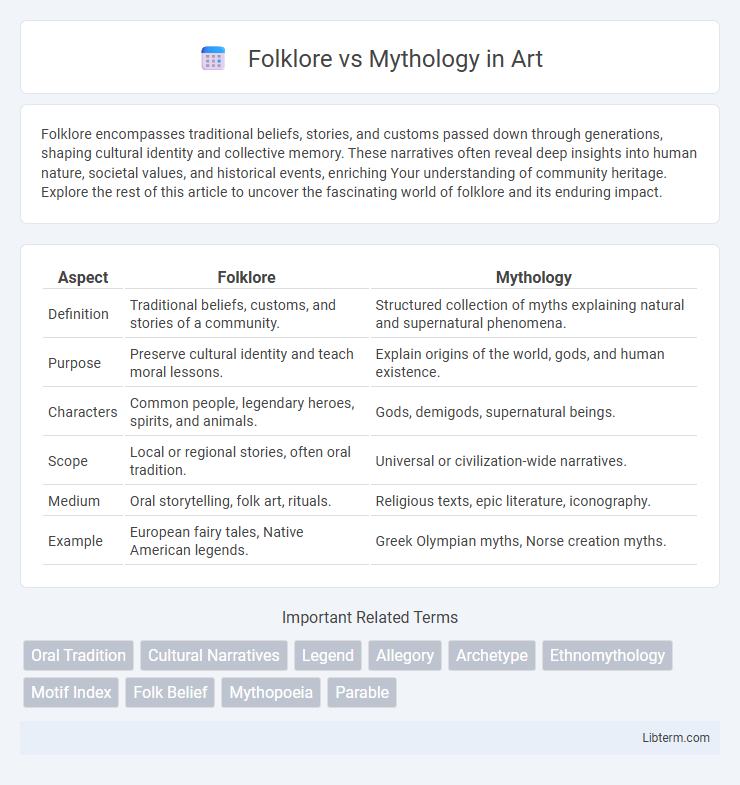Folklore encompasses traditional beliefs, stories, and customs passed down through generations, shaping cultural identity and collective memory. These narratives often reveal deep insights into human nature, societal values, and historical events, enriching Your understanding of community heritage. Explore the rest of this article to uncover the fascinating world of folklore and its enduring impact.
Table of Comparison
| Aspect | Folklore | Mythology |
|---|---|---|
| Definition | Traditional beliefs, customs, and stories of a community. | Structured collection of myths explaining natural and supernatural phenomena. |
| Purpose | Preserve cultural identity and teach moral lessons. | Explain origins of the world, gods, and human existence. |
| Characters | Common people, legendary heroes, spirits, and animals. | Gods, demigods, supernatural beings. |
| Scope | Local or regional stories, often oral tradition. | Universal or civilization-wide narratives. |
| Medium | Oral storytelling, folk art, rituals. | Religious texts, epic literature, iconography. |
| Example | European fairy tales, Native American legends. | Greek Olympian myths, Norse creation myths. |
Understanding Folklore and Mythology
Folklore comprises the traditional beliefs, customs, stories, songs, and practices passed through generations within a community, emphasizing everyday life and cultural identity. Mythology consists of structured narratives about gods, supernatural beings, and heroic figures that explain natural phenomena and human origins, often serving religious or moral purposes. Understanding folklore involves analyzing its oral transmission and community context, while mythology requires exploring symbolic meanings and cosmological frameworks.
Key Differences Between Folklore and Mythology
Folklore comprises traditional stories, customs, and beliefs passed orally within a community, often featuring everyday characters and local settings, while mythology involves sacred narratives centered on gods, creation, and cosmic events foundational to a culture's religion. Folklore emphasizes practical morals and social norms, whereas mythology seeks to explain the universe, human existence, and divine interactions. The temporal scope of folklore is generally more fluid and adaptive, contrasting with mythology's often ancient, fixed canon of revered tales.
Origins and Historical Contexts
Folklore originates from the customs, stories, and beliefs of everyday people passed orally through generations, reflecting the social values and practices of specific communities. Mythology comprises structured narratives about gods, heroes, and cosmic events, often codified in religious or cultural systems to explain natural phenomena and human existence. Historical contexts reveal folklore as grassroots cultural expressions, while mythology typically emerges from ancient civilizations with institutionalized religions and written traditions.
Common Themes in Folklore and Mythology
Folklore and mythology both explore common themes such as creation, morality, and the supernatural, reflecting human attempts to understand the cosmos and societal values. They often include archetypal characters like heroes, tricksters, and gods, serving as vehicles for cultural lessons and existential questions. These narratives reveal shared motifs of transformation, fate, and the battle between good and evil, integral to their cultural significance and transmission.
Functions in Society and Culture
Folklore preserves community values and shared identity by transmitting oral traditions, customs, and moral lessons across generations, fostering social cohesion and cultural continuity. Mythology explains natural phenomena and existential questions through divine narratives and symbolic stories, reinforcing cultural beliefs and legitimizing social hierarchies. Both serve distinct functions in society, with folklore grounded in everyday life and collective memory, while mythology provides sacred frameworks that influence rituals and worldview.
Narrative Structures and Storytelling Styles
Folklore typically features oral storytelling traditions with episodic narratives, emphasizing community values and everyday life through simple, repetitive structures that aid memorization and transmission. Mythology often presents more complex, linear narratives with grand cosmic themes, involving gods and heroes to explain natural phenomena and cultural origins. Both employ symbolic language and archetypal characters, but folklore tends to adapt fluidly across regions, while mythology maintains a more rigid, canonical framework.
Transmission: Oral Tradition vs Written Records
Folklore primarily relies on oral tradition, passed down through generations by storytelling, songs, and rituals, which allows for variations and adaptations in different cultures over time. Mythology often combines oral transmission with written records, as ancient civilizations recorded their myths in texts like the Epic of Gilgamesh or Hesiod's Theogony, preserving fixed narratives. The interplay between oral and written methods influences the preservation, interpretation, and dissemination of cultural beliefs and narratives within societies.
Iconic Examples from Around the World
Folklore and mythology both preserve cultural narratives but differ in scope and purpose; folklore comprises local tales like the Japanese Kitsune, a fox spirit known for shapeshifting, while mythology includes grander narratives such as Greek myths featuring gods like Zeus. Iconic examples from folklore include the Brothers Grimm's fairy tales from Germany, rich in moral lessons and village legends, contrasting with mythology's epic stories like the Norse sagas of Odin and Thor that explain natural phenomena and cultural origins. These narratives provide critical insights into the values, beliefs, and histories of societies worldwide, shaping cultural identity through orally transmitted stories.
Modern Interpretations and Adaptations
Modern interpretations of folklore emphasize its role in preserving localized cultural practices and oral traditions, adapting them into contemporary media such as films, video games, and literature to maintain relevance in globalized societies. Mythology is often reimagined in modern adaptations as allegorical narratives that explore universal themes like heroism, morality, and human nature, with franchises like Marvel and Greek myth retellings exemplifying this trend. Both folklore and mythology undergo transformation through reinterpretation, blending historical context with contemporary values to engage new audiences and deepen cultural understanding.
The Enduring Impact on Contemporary Culture
Folklore and mythology shape contemporary culture by preserving collective identities and shared values through stories, rituals, and symbols. Folklore captures community traditions and everyday beliefs, while mythology provides grand narratives explaining existential questions and cosmic order. Their enduring impact is evident in modern literature, film, and art, where ancient themes and archetypes continue to inspire and influence cultural expression globally.
Folklore Infographic

 libterm.com
libterm.com